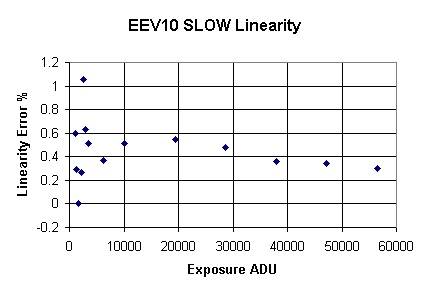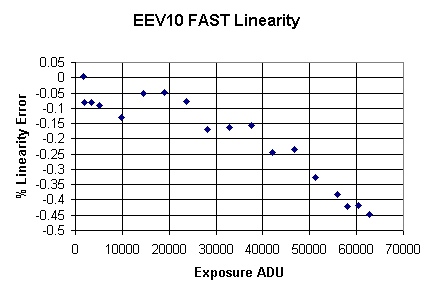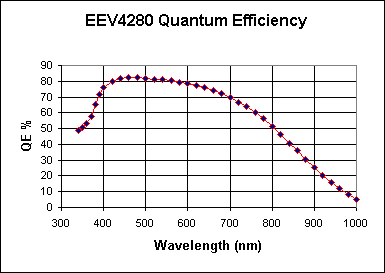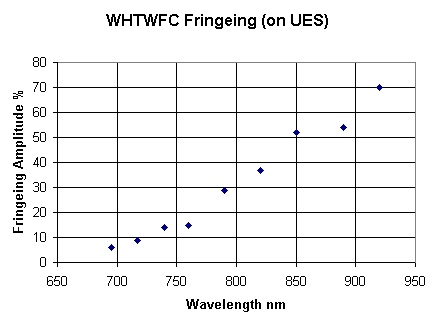EEV10a Parameters for UltraDAS + SDSU Gen.2
NB these figures refer to EEV10a when it
was used with a Gen. 2 controller. Converted to Gen. 3 on the 22nd March
2007
Device Identification
| Chip name |
EEV10a |
| Year of manufacture |
1997 |
| Serial number |
7043-16-4 |
| First light on La Palma |
March 1998 |
| Description |
EEV42 thinned, converted to run with UltraDAS
August 2000 |
Operational Characteristics
|
Speed
|
Slow
|
Fast
|
|
Bias(ADU)
|
630
|
570
|
|
Gain(e/ADU)
|
1.3
|
2.6
|
|
Noise(e)
|
3.5
|
5
|
|
Noise (ADU) |
2.7 |
1.9 |
|
Linear to (ADU)
|
+/-0.5% to 60k
|
+/-1% to 55k
|
|
Readout time (s)
|
55
|
37
|
Binning
All binning modes up to 4 x 2 have been tested in both
speeds with no increase in noise.
Linearity measured using the this method
on the 18th January 2002


| Vertical CTE |
>0.999999 |
| Horizontal CTE |
>0.999999 |
Physical Characteristics
| Pixel Scale (isis blue) |
0.19 arcsecs/pixel |
| X Pixel size |
13.5 microns |
| Y Pixel size |
13.5 microns |
| X size in pixels of digitised area |
2148 |
| Y size in pixels of digitised area |
4200 |
| X size of useful imaging area |
2048 |
| Y size of useful imaging area |
4100 |
| X start of useful imaging area |
51 |
| Y start of useful imaging area |
0 |
| LN2 capacity of cryostat |
2.5 litres |
| Cryostat window thickness |
4 mm |
| Distance from window to CCD |
10 mm |
| Cryostat window size |
36 x 66 mm |
Operational Parameters
| Operating temperature |
153K |
| Preferred amplifier |
L( R provides the same performance ) |
| Anti-blooming available |
no |
Measured Characteristics
Quantum Efficiency

Full QE curve for EEV4280 in tabulated form,
measured at ATC March 99
| Dark current |
4 e/hour @ -120 degrees C |
| Full well bloom limit |
~150000 electrons |
| Chip flatness |
Profile scan shows centre section to be flat to < 1 micron |
| Cosmetics |
There are about 2ish pixel/column defects plus a cluster of single
pixel defects. See dark frame. |
| Cosmic Ray count |
~2000 events/chip/hour |
Fringing. See below a graph of fringe amplitude vs wavelength
for an EEV.
 |
| 





